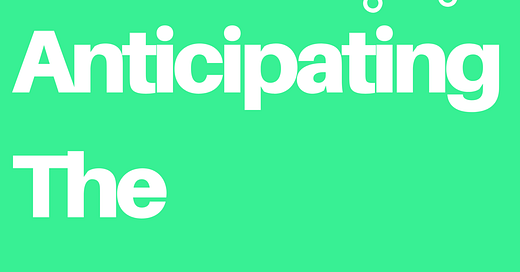India Policy Watch #1: Ganesh Ji & Lakshmi Ji To The Rescue
Insights on domestic policy issues
— RSJ
Sometime last week, this newsletter marked three years of its existence. A blink of an eye in the larger scheme of things. Yet, it feels nice to have reached this milestone. Consistency might be the virtue of an ass, but it is a virtue nevertheless. In these three years, we have stayed somewhat true to our purpose in every edition we have sent out. We have analysed policies intending to anticipate their unintended consequences. We have debated about what’s good in the long term for India since we care for it. And we have tried to influence or perhaps shape the demand side of the political equation by increasing awareness about public policy among our readers. This is a marathon, and we are in it for the long run. No effort is too small. We cannot thank you enough for the generosity of your time in reading us.
Anyway, returning to one of the things we care for deeply. India’s future prospects. No amount of thinking about it could have brought us to the conclusion that Arvind Kejriwal reached last week about this vexing issue. The leader of AAP addressed a press conference where he asked the PM for a critical policy intervention:
"I appeal to PM Modi that the Indian currency has the picture of Gandhi ji on one side, it should remain like that. But on the other side, there should be a picture of Ganesh ji and Laxmi ji. We need efforts to make the Indian economy stronger, but we also need the blessings of gods and goddesses," he said.
While Laxmi is the goddess of prosperity, Lord Ganesh is believed to solve all our 'vighnas' (problems), Kejriwal said.
"We are not asking for printing fresh currency, but all the new currency that gets printed, this should be implemented. Eventually, the circulation of these notes will increase," he said.
As the yesteryear villain Ajit (“the loin”) would say: smart boy.
Soon another AAP leader, Atishi, took the battle to the BJP camp:
“BJP leaders can hate Mr. Kejriwal but why hate Hindu deities Lakshmi and Ganesh? Do you not want the blessings of our gods to be with the people of the country? I humbly request leaders of the BJP not to oppose this noble proposal. It is not just a proposal from Arvind Kejriwal, but is the proposal of 130-crore citizens of this country.”
I don’t remember when I (among them aforementioned 130-crore citizenry) signed up for this proposal, as Atishi suggested. There’s something to be said about how times change people. A person whose last name ‘Marlena’ was derived from her family’s belief in the Marxist-Leninist strand of godless communism is now asking for deities to be put on currency notes as a policy measure. I guess this is how things roll in politics.
Keeping an open mind, I looked around for evidence correlating having Lakshmi Ji and Ganesh Ji on currency notes with economic growth anywhere in the world. I didn’t make much headway. No developed nation has ever had them on its notes. Indonesia did issue 20,000 Rupiah notes from 1998-2005 with Ganesh Ji on them, but it was discontinued in 2008. The Indonesian economic growth during those intervening years was nothing to write about. I also came across a few Devdutt Pattnaik videos on Lakshmi Ji and yajman and how the yajman must make sure she doesn’t leave them. Very compelling stuff. Considering he was with the Future group during those days and it has since gone into bankruptcy, I’m not sure it helped much there too. The bottom line, there isn’t a lot of academic literature out there to help with the Kejriwal thesis.
The AAP move has spawned numerous opinion pieces, of course. Some have accused them of soft Hindutva (a unique Indian term like ‘mild lathicharge’) and being a ‘B team’ of the BJP. Others have lamented the loss of idealism in politics. And then some think it is the pragmatic way for Kejriwal to turn the tables on the BJP and nothing more should be read into it. Well, who knows? I think it is helpful to examine this in the context of public choice theory. There are three conclusions one can draw from this, which I will elaborate here.
Firstly, we must acknowledge that any political system, particularly a democracy, rewards a politician who appears to be doing the right things. Now, what’s the ‘right thing’ is defined by the moral standards prevailing at a particular time in that society. Most politicians will try to do what is considered good by the people. But moral standards aren’t constant. They change with time. An astute politician, therefore, needs to be morally flexible to change according to what’s considered good at a point in time in society. Moral rigidity might be good for philosophers and idealists but not for politicians. There’s no incentive for a politician to question the prevailing moral standards. A rare politician who does that is playing a high stake game. They often lose. And a politician who loses is worthless.
The conventional moral standard prevailing now in India allows Kejriwal to make a statement like this. Anyone in India can now position their bad-faith actions or beliefs in a way that they fit this conventional standard. Politicians are power-hungry. Their incentives are aligned that way. A singular pursuit of these incentives separates a good politician from the bad one. It makes them sociopaths, but that’s an unfortunate side effect they learn to live with over time. The question in India today shouldn’t be why Kejriwal is making such bizarre demands. The real question is what does it say about our society that politicians can make such demands in the garb of what is good or right for the society.
Secondly, there’s this belief that democracy, with its periodic elections, changes in the mood of the people and a system of checks and balances can temper this power lust of the politicians and channel it for the good of society. In this view, Kejriwal (or any another politician, really) is making these statements to do well in some elections (Gujarat?), but once he’s in power, his true moral self will be back, and that will be good for the society. He’s got to play the game, you see.
There are two problems I see with this thesis. One, it assumes that the conventional moral standards of society are permanent and any number of such statements don’t change them. Once the gains from such a statement are realised, society, like some kind of a memory foam, will remember its original shape and go back to demanding what’s right for it. This is optimistic and isn’t borne out by history.
Two, it also assumes that a politician who gets positive returns from this approach will not continue doing so in an ever-spiraling escalation down this path. That will be an illogical option for any power-hungry politician who doesn’t like to lose. He would like to keep doing more of the same if the returns don’t diminish. This isn’t about what’s right. It is about ensuring he gets the power to do what he thinks is right in the larger scheme of things. Politicians are plain old opportunists. This is why I don’t understand how any logical mind can have ‘tribal loyalty’ to a particular political party.
Thirdly, some of you may ask this. On the one hand, we advocate free markets, where we believe that individual incentives come together spontaneously for everyone to benefit. On the other, I’m making a case that in the political marketplace, individual incentives don’t work for the overall good. How do I square this? Well, for one, there is a fundamental difference between a businessman (to use a gendered term) and a politician. The businessman has the belief and the incentives (long and short term) to maximise profit. He might couch it with good intentions in his public statements because of his bias for social desirability. This bias won’t change his actions, though, because he’s a rational actor. He might say something against his conviction but he will do exactly what will maximise his incentives. In the case of a politician, this might play out differently. The social desirability bias can, and often does, change their immediate actions in a manner that’s different from their long-term incentives. Not only will he speak against his conviction to be more accepted, he might also act in the same manner. The Kejriwal statement is a good example of this. Also, history has shown that voters are different from consumers. Voters get swayed by emotions, tribal loyalties, affiliations and demagoguery. Consumers might be swayed temporarily, but soon rationality takes over. A good example of this distinction is evident in the film business in India. Over the past few years, the incentive to make films that portray some glorious Hindu heritage without historical basis was quite high. This led to a steady pipeline of films with ever-increasing religious jingoism and ramping up of Hindu ethno-nationalist pride. Yet, within a relatively short period, the consumers have seen through this ‘formula’, and the recent box office rejection of these films bears testimony to this. Free markets have corrections built in because the assumption of rational actors largely holds. That doesn’t work for the political marketplace.
At a broader political level, Kejriwal’s statement is an interesting reflection of how the political class is reading society now. Conceptually, there are two possible approaches to contend with the formidable politics of Hindutva. One option is to counter it with the diversity of thoughts and iconographies within Hinduism to deny a monolithic, Abrahamic version of the religion that Hindutva desires to apply to all its adherents. This diversity or internal divisions that often cancelled each other out in electoral politics was considered a societal default position. There wasn’t much to do to change it, except to get the electoral arithmetic right and capture power. That default is changed now and you could try to bring that back. That’s one play in the current political landscape. The other option is to join the Hindutva politics bandwagon, raise new issues, however bizarre and peddle those optics to the public. The goal isn’t to outdo the original Hindutva masters. Pursuing that would be folly. The idea is to make the Hindutva plank par for the electoral course in a manner that voters no longer find it necessary enough to make it a part of their voting calculus. If everyone is on to it, it no longer is a differentiator. It is clear now that the political class is giving up on the first option. There will be greater convergence on the second option. The underlying belief among them seems to be that one can retrace the steps back after having used the second option opportunistically. That’s what those supporting Kejriwal believe. I’m not so sanguine.
Postscript: Pratap Bhanu Mehta articulates the fundamental fallacy of an either/or formulation in making these choices in his excellent column in the Indian Express: ‘Why it’s wrong to say that Hinduism is a product of colonialism’. He writes:
If the Hindutva project is to homogenise and centralise Hinduism, the answer to that cannot be the historically ill-founded and philosophically inept strategy of denying the historical existence of Hinduism altogether. Or worse, to imagine that pre-modern Hinduism is simply an endless proliferation of sects, walled up, with few interconnections and not dependent on a shared cosmology, social system, or even intellectual concerns. It is to reduce Hinduism to simply an aesthetic heteroglossia, and not take seriously any of its imaginative constructions, intellectual endeavours or practices. If Hindutva uses identity to erase diversity, it is also important to avoid the opposite fallacy: To use diversity to deny the fact that the diverse parts may also be parasitic on referencing a larger whole, and common canons of contestation.
India Policy Watch #2: The Tyranny of Context in Electoral Systems
Insights on domestic policy issues
— Pranay Kotasthane
Israel voted for the fifth time in four years earlier this week. The former PM Benjamin Netanyahu is set to come back once the arduous coalition-building talks reach another precarious consensus. Opinion pieces routinely refer to this process of coalition stitching in Israel as “horse-trading”. Meanwhile, the vote share of the extreme right-wing party Religious Zionists has more than doubled, and they will now demand their pound of flesh in the government formation talks.
One aspect of the Israeli political system should interest many Indians. Unlike India, Israel follows the List Proportional Representation (PR) system. This system optimises for the proportional conversion of vote share into equivalent seat share. People vote for a party, not a candidate. All parties with a vote count above a minimum threshold (3.25% currently) are sure to have their representatives in the Knesset.
India follows the First Past the Post (FPTP) system. Voters vote for a candidate. The one who polls the most votes wins. The parties fielding the losing candidates get zero seats, even if they poll just one vote lesser than the winning candidate’s party in every constituency. The disproportionality between the vote share and seat share is a feature of this system, not a bug. So a party with a 30 per cent vote share might be able to win a majority of seats and form a government.
Now, one is sure to come across this statement in casual conversations about elections in India: “the root cause of unfair electoral representation is that India follows the primitive FPTP. We should instead move on to a ‘fairer’ Proportional Representation (PR) system, one in which the legislature represents the true vote shares.”
But the lived experiences of Israel’s (and earlier, Italy’s) PR system show it’s riddled with problems too. In this article, I explain why PR is an overrated solution to India’s problems with electoral representation.
Issue 1: The Purpose of an Electoral System
A PR system can be perfectly representative and yet utterly dysfunctional. The proponents of the PR system are right when they say that it is fairer than FPTP in translating vote shares into seat shares. By design, it will have another positive effect of having representation of many more political parties in the legislature.
At the same time, another inescapable feature of the PR system is post-election coalition-building, in which many fringe parties hold all the aces. Israel’s recent electoral struggles are a case in point. Many smaller extremist parties are openly demanding specific ministerial posts as a precondition for their support to Netanyahu. In a democracy that is 120 times bigger than Israel, this problem of unstable and unworkable coalitions could get amplified. A government would be formed by a coalition of 20-30 parties, and the smaller partners will have disproportional leverage. Fewer governments will complete their full term. Israel has had 25 elections to the Knesset thus far, and only on nine occasions has the government completed or come closer to completing the four-year term.
Confronting the trade-off between fairness in translating vote shares to seat shares and effectiveness in creating governments that can perform is inevitable. And I’m not sure if the PR system in India can strike the right balance.
I spoke with a friend who understands India’s polity much better than me. In his view, the fundamental goal of an electoral system is not necessarily proportional representation but to render a government legitimate. And on that count, Indian governments elected using the FPTP system have been broadly accepted by the Indian electorate after the elections. The current government is testing the limits of this acceptance, but its legitimacy to govern is not under serious question yet.
Issue 2: The Party vs the Legislator
In a PR system, the legislator is virtually a rubber stamp, as candidates vote for parties, not specific candidates. The political party is at the front and centre of the system, unlike in an FPTP system where people vote for individuals to represent them.
In the Indian context, political parties are an already unhealthily powerful institution which has accreted more power through instruments such as the anti-defection law and opaque electoral bonds. Switching to a PR system would break even the modicum of connection between legislators and the electorate.
Issue 3: The Fringe as the Centre
In a divided polity such as India’s, successful political parties have no option but to cater to a broad section of the electorate to win the 30-40 per cent vote share. In a PR system, parties have no incentive to appeal to a broad section of the electorate. As long as they can win the votes of a narrow group, they are assured of seats, which would be enough to make them “king-makers”. Moreover, as the Israel experience has repeatedly shown, a PR system can legitimise small, extremist parties, a result India definitely doesn’t need at this time.
These three issues highlight that the PR system might make us worse off. Of course, this debate between PR and FPTP is not new. Some countries, such as Germany, have tried a mixed-member system in which voters cast one vote for their legislator (who has to qualify through FPTP) and another for a party list (which then translates to seats on a proportional basis). But one thing’s for sure. Every alternative is path-dependent and not without drawbacks.
The unthinking support for shifting to PR at the margins is a specific case of a general phenomenon I call the ‘tyranny of context’. The existing familiar system appears unworkable in this phenomenon because we know its pitfalls too well. On the other hand, a reform from another context appears attractive because we don’t understand it at all.
Changing to a PR system is unlikely to result in better governance outcomes. On some parameters, it might make things worse. Ambedkar had famously warned:
“However good a Constitution may be, if those who are implementing it are not good, it will prove to be bad. However bad a Constitution may be, if those implementing it are good, it will prove to be good.”
What he said of the Constitution also seems to apply to the electoral system. It’s better to look for solutions within the constraints of the FPTP system, perhaps. What do you reckon?
PolicyWTF: Abnormal Bovine Movement
This section looks at egregious public policies. Policies that make you go: WTF, Did that really happen?
- Pranay Kotasthane
This headline in the Deccan Herald caught my attention:
Online pass permit to be mandatory for cattle transport in Karnataka: The new cattle pass permit system will include transport certificate, ownership document and veterinary first-aid equipment.
Let that sink in. If you own a cow and want to transport it to another place 15 km or more away, you need to first get appropriate blessings from the Animal Husbandry Veterinary Services Department manifested as an online cattle pass permit. Never to miss a revenue opportunity, the owner of the transporting vehicle also has to pay a fee to obtain the permit. Plus GST.
There’s a backstory to these absurd rules. In January 2021, the state government passed the Karnataka Prevention of Slaughter and Preservation of Cattle Act, imposing a blanket ban on cattle slaughter. One of the sections of the Act prohibited the transport of cattle for slaughter. But, of course, cattle need to be transported for reasons other than slaughter. And hence, the online permit will now ascertain that the movement is for a bonafide reason.
That Act also gives the Police the power to search and seize if they have reason to believe any violations have occurred. It would be funny if it weren’t so tragic that precious state capacity is being expended on bovine transport controls in one of the country's best states.
HomeWork
Reading and listening recommendations on public policy matters
[Knowledge Base] The Ace Electoral Knowledge Network has a good overview of all electoral systems, their weaknesses, and their strengths.
[Podcast] In the next Puliyabaazi, Sumit Kumar of Bakarmax webcomic discusses the state of Indian comics and animation.
[Podcast] Anita Anand and William Darlymple’s Empire presents familiar stories of colonialism in a new light.
[Report] Why do Indian Founders in the Space Industry start their start-ups abroad? The reasons equally apply to start-ups in other deep tech sectors.










Share this post